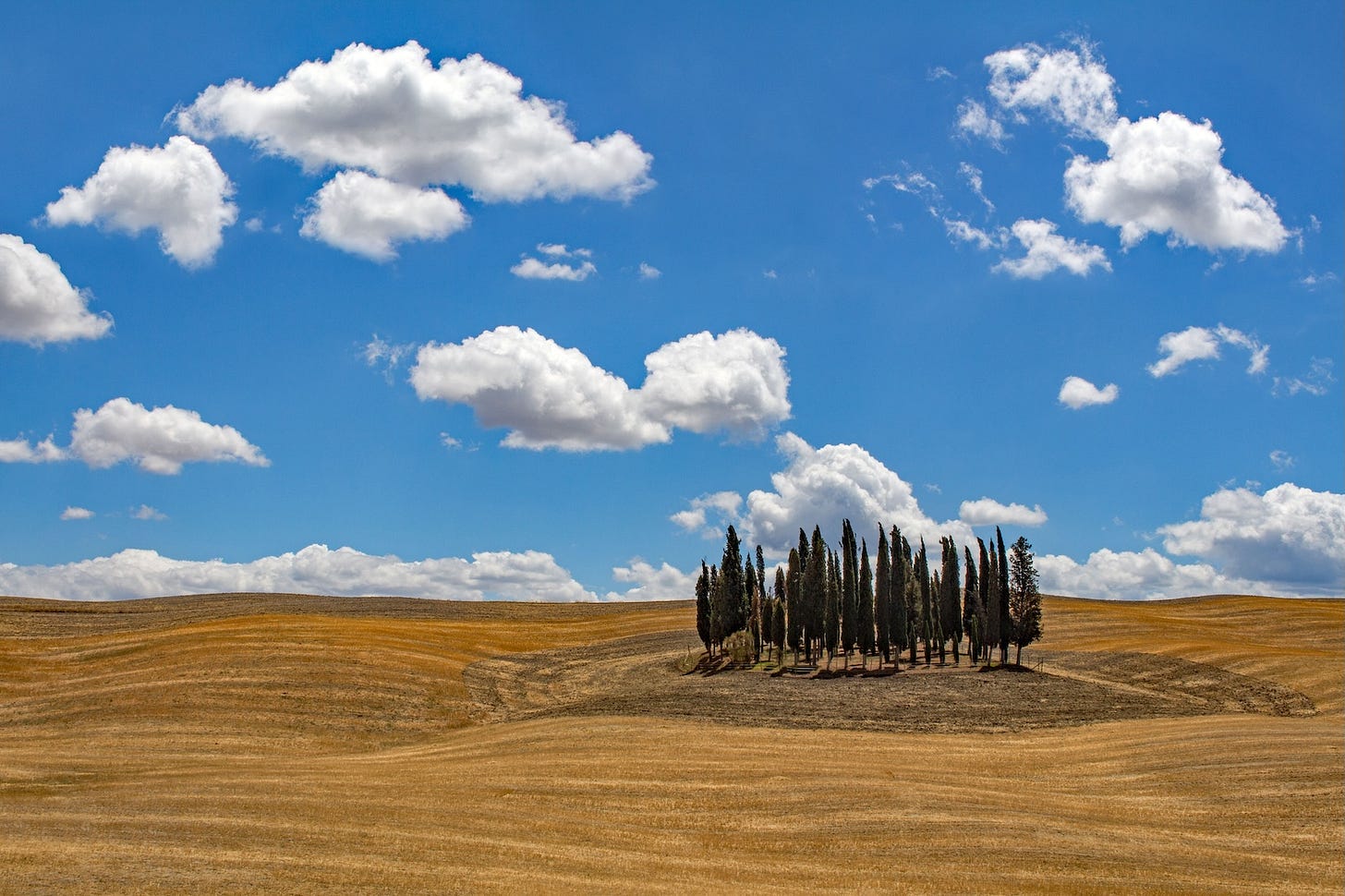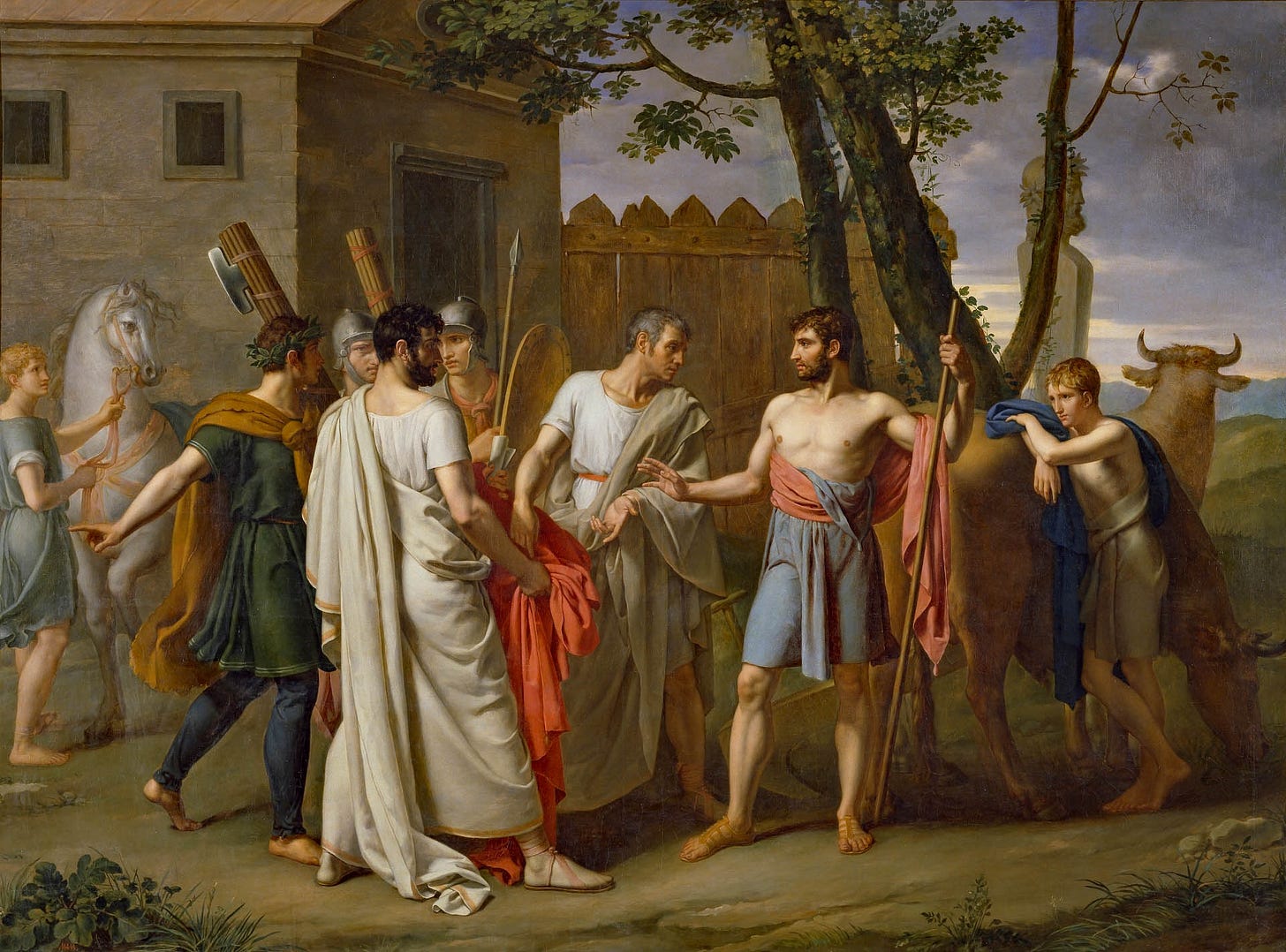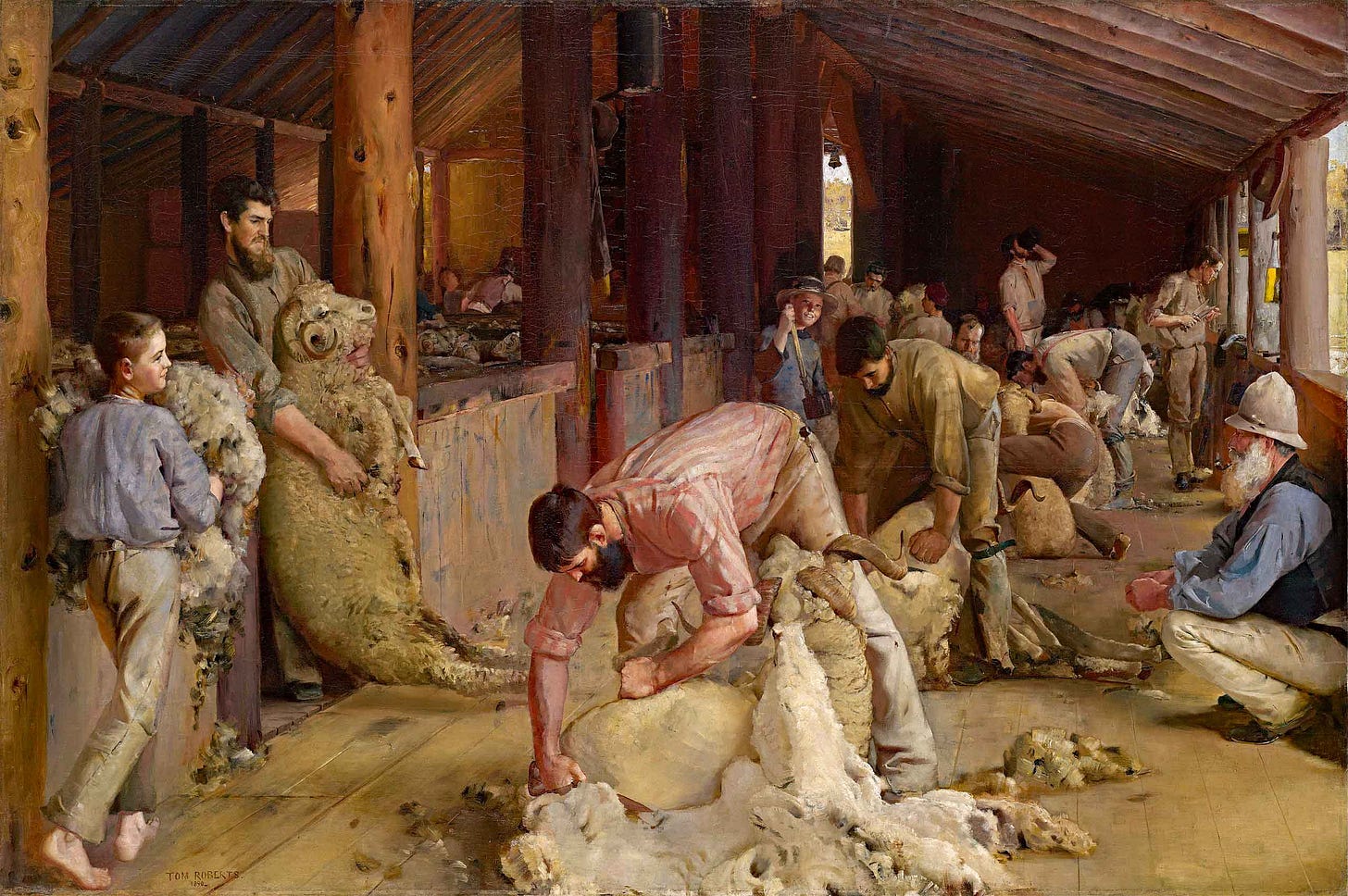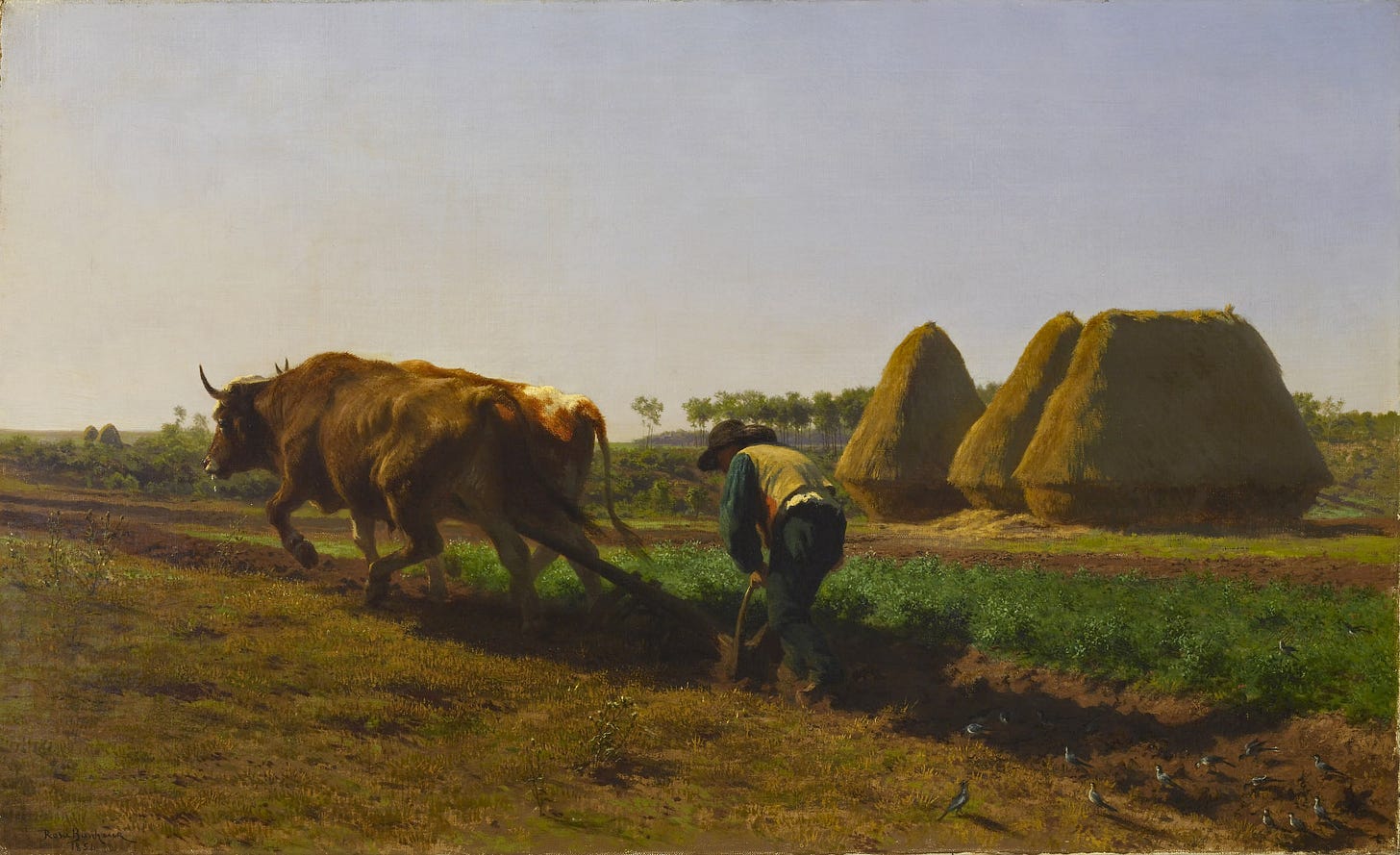Why You Should be a Farmer
Cato the Elder's timeless advice, and warning, to the Romans and to us...
What is the noblest profession of Man?
Ask any group of people in the postwar Western world which is the most honourable of callings, and you will invariably spark debate — a doctor perhaps, or possibly a teacher, if not a charity-worker or some other avenue of public service?
If you could ask an Ancient Roman however, the answer would be straightforward — a farmer. Many Romans indeed articulated this, but none more memorably so than Cato the Elder, a man who at times served as a soldier, lawyer and a statesmen, but remained a lifelong farmer.
Considered the father of Roman conservatism and the fiercest defender of Roman traditions, Cato authored many seminal works lauded for generations to come. It is fitting, however, that the only one to still survive intact — and indeed the oldest work of Latin prose to survive at all — is a little known text simply called ‘On Agriculture’.
As a practical guide for aspiring farmers, De Agricultura contains many precise details on the cultivation of crops and rearing of livestock. It is also, however, a defence of farming itself, written in an age when Rome was increasingly seduced by foreign conquest and foreign luxuries, in circumstances far less removed from our own than we might like to think.
Cato believed that farming was Man’s highest calling. Today, we look at what his work can teach you — whether you plan to pick up the plough or not — about the benefits of answering that call…
The Quiet Heroism of the Countryside
“it is from the farming class that the bravest men and the sturdiest soldiers come”
Cato the Elder, De Agricultura, Preface
The proceeds of the land are the most basic resource we have. Prior to the Industrial Revolution, they were also the bedrock of economies from the lowliest villages to the mightiest empires.
Ancient Rome was both an example and the example of this, where almost every aspect of Roman culture to endure from the days of the kings was tied in some way to agriculture. Many of the most illustrious names of the Eternal City indeed have the most rustic roots. The cognomen Piso, after all, literally means ‘to grind corn’, while Fabius, Lentulus, and Cicero derive from faba (bean), lens (lentil) and cicer (chickpea), respectively (Pliny the Elder, Natural History, XVIII.3).
The English word ‘pecuniary’, meaning ‘related to money’, has come down to us directly from the Latin word for money, pecunia — which itself derives from pecus (cattle). Offerings from produce were a regular feature of religious ritual, while the most ancient rite of marriage among the aristocratic classes was the act of confarreatio — the sharing of a spelt cake.
It is little wonder therefore that to the Ancient Roman, there were few surer signs of man’s integrity than his success as a farmer. After all, it is not possible to be a successful farmer without great diligence and a certain humility:
It is true that to obtain money by trade is sometimes more profitable, were it not so hazardous; and likewise money-lending, if it were as honourable. Our ancestors held this view and embodied it in their laws... And when they would praise a worthy man their praise took this form: ‘good husbandman, good farmer’; one so praised was thought to have received the greatest commendation”
Cato the Elder, De Agricultura, Preface
It is this distinction which is central to the legend of one of history’s most lauded statesmen — Cincinnatus. For when Rome was in the gravest of crises, and the Senate resolved to offer him the Dictatorship, the ambassadors charged with bearing the news famously discovered him in the act of ploughing his fields. When, upon leading his country to victory he indeed returned to his farm, his example exalted farming itself as the profession of heroes, and so too their anchor to reality.
There can be, after all, no cutting corners in agriculture — good yields are obtained by sowing and harvesting at the correct times, in the correct conditions, irrespective of the farmer’s own motivation on the given day, and by the correct understanding of the land itself in the first place. Idleness or ignorance on the farmer’s part, indeed, is severely punished before his produce even comes to market, cutting with merciless precision through any pretence or self-delusion.
Yet farming is not merely a natural antidote to ego. It can also be Man’s ultimate trainer…
The Benefits of Not Being in Control
“In rainy weather try to find something to do indoors. Clean up rather than be idle. Remember that even though work stops, expenses run on none the less”
Cato the Elder, De Agricultura, 5.7-8
In farming, no plan survives contact with the weather. Rains come and go, at times without warning, and can endure for hours, days or even weeks. In order to survive, the good farmer does not dwell upon what he cannot control, but rather engages with what he can.
Rarely are there moments when nothing can be done. In an age of the division of labour, it is easy to waste time in many walks of life, justifying it with the excuse of waiting for someone else to do or fix something. But the farmer is by necessity a multi-tasker and a multi-thinker, and cannot survive in his profession unless he is efficient at both. Indeed Cato reserved particular disdain for farm managers who pleaded bad weather as an excuse for idleness:
“If it has been a rainy season, remind him of the work that could have been done on rainy days: scrubbing and pitching wine vats, cleaning the farmstead, shifting grain, hauling out manure, making a manure pit, cleaning seed, mending old harness and making new; and that the hands ought to have mended their smocks and hoods. Remind him, also, that on feast days old ditches might have been cleaned, road work done, brambles cut, the garden spaded, a meadow cleared, faggots bundled, thorns rooted out, spelt ground, and general cleaning done”
Cato the Elder, De Agricultura, 2.3-4
It is not, however, merely in the allocation of one’s time that farming both demands and encourages ingenuity. A farm, after all, is replete with all manner of unexpected resources that can make the life of the creative farmer easier:
“If bedding runs short, gather oak leaves and use them for bedding down sheep and cattle. See that you have a large dunghill; save the manure carefully, and when you carry it out, clean it of foreign matter and break it up. Autumn is the time to haul it out. During the autumn also dig trenches around the olive trees and manure them.”
Cato the Elder, De Agricultura, 5.7-8
It is ultimately from this quality that broader virtue can spring. The wasteful farmer falls alone, while his resourceful peer understands that a healthy community is an unparalleled asset, and fostering one reaps many rewards. Be it in the lending of equipment or manpower, goodwill is as invaluable a currency as gold when you yourself are suddenly in need:
“Be a good neighbour, and do not let your people commit offences. If you are popular in the neighbourhood it will be easier for you to sell your produce, easier to let out your work, easier to secure extra hands. If you build, the neighbours will help you with their work, their teams, and their materials; if trouble comes upon you, which God forbid, they will be glad to stand by you”
Cato the Elder, De Agricultura, 4.1
The farmer is thus compelled to distinguish between the necessary and the superfluous, and grows resistant to the temptations of luxury. Such was the case of Cato himself, whose parsimony held up a mirror to the growing extravagance of Rome’s increasingly internationally-minded elite.
At a time when the great Scipio Africanus, conqueror of Hannibal, could do no wrong, it was Cato alone who denounced the general’s profligacy. For when Scipio made lavish gifts of money to his troops, Cato castigated the move as corrupting to the character of soldiers ill-accustomed to excess, who would now be needlessly tempted by “wanton pleasures when their pay exceeded their actual needs” (Plutarch, Life of Cato the Elder, 3.6).
Upon his election to the praetorship in 198 BC, Cato would then apply this very philosophy as the governor of Sardinia, where his own restrained example following a succession of rapacious predecessors — in a far from wealthy province — ensured that “Roman power never inspired its subjects with greater fear or affection” (Plutarch, Life of Cato the Elder, 6.3).
To be resourceful is to work with what you have. But to truly learn to work with what you have, you must first learn to appreciate what exactly it is that you have.
By doing so, you will discover two further virtues in farming that Cato preached. Fatally, however, the author himself would not practise the most critical of them, thus undermining all of the others, and setting the stage for both his own ultimate failure, and the ruin of the Roman Republic itself.
As a result, today De Agricultura serves not only as a guide, but also as a warning, so that you can avoid the same fatal mistake…






